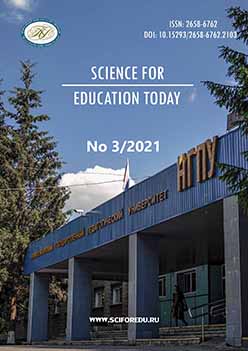Формирование психологической безопасности у студентов посредством развития самоуправляющих механизмов личности
Formation of psychological safety in university students through developing self-regulatory personality mechanisms
Author(s): Irina Stanislavovna Morozova, Anastasiya Evgenievna Kargina, Daria Nikolaevna Grinenko, Evgenia Aleksandrovna MedovikovaSubject(s): Higher Education , Educational Psychology, Psychology of Self
Published by: Новосибирский государственный педагогический университет
Keywords: Professional training; Psychological safety of a person; Educational process; Students; Choice of decision-making methods; Psychological and pedagogical interventions; Reflective seminars;
Summary/Abstract: The article considers the problem of psychological safety formation in future professionals at the stage of pursuing a university degree through the development of self-regulating personality mechanisms. The purpose of the research is to determine the features of the formation of psychological safety among university students through the development of self-regulating personality mechanisms. Materials and Methods. Data collection was carried out using the following inventories: H. Zakher and M. Frese’s ‘Occupational future time perspective’, S. S. Goncharova’s ‘Ways to overcome negative situations’, S. Norman, D. F. Endler, D. A. James, M. I. Parker’s ‘Coping inventory for stressful situations (adapted by T.A. Kryukova), Test of resilience by S. Muddy (adapted by D. A. Leontiev). The sample consisted of 50 senior students in the final year at university. The data obtained were interpreted and subjected to statistical analysis using Student's t-test. Results. The authors have defined the concept of ’formation of psychological safety in university students’, as a purposeful, controlled interaction of stakeholders in education which results in the systematization of ideas about psychological safety, acceptable ways of regulating one's activity, taking into account the specifics of the life situation. It has been revealed that reflexive seminars contribute to formation of psychological safety in future professionals of industrial enterprises. Conclusions. The article concludes that senior students who have participated in reflexive seminars demonstrate a detailed approach to the analysis of events in the surrounding reality, set clear goals and think over action plans, independently make decisions, appropriately respond to emerging difficulties, which are criteria for the formation of psychological safety of a person. The authors argue that the research results can be used for designing formative programs for higher educational institutions in order to enhance students’ psychological safety.
Journal: Science for Education Today
- Issue Year: 11/2021
- Issue No: 3
- Page Range: 42-57
- Page Count: 16
- Language: Russian

